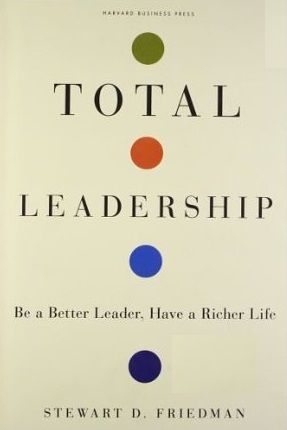Stewart D. Friedman provides a detailed, conscious journey for leaders and aspiring leaders seeking great personal integration and more effective application of their strengths.

To Lead, First Become Yourself
Stewart D. Friedman – faculty member of the University of Pennsylvania’s Wharton School and director of the Leadership Development Center at Ford Motor Company – helps you improve your performance in four “domains”: “work, home, community and self.” He asserts that when you identify your core values and align your actions with these values, you can achieve harmony in all areas of your life and excel as a leader. His book is a take-home version of the Total Leadership program and workshop he developed and teaches at Wharton.
“Total Leadership”
Friedman laments that many people believe that excelling in one area of life means sacrificing in other areas. He cites CEOs who seek more time with their children and stay-at-home parents who believe their careers are over. This lack of integration leaves people unfulfilled, resentful and guilty. Friedman’s Total Leadership approach addresses these conflicts by providing tools to strengthen all four life domains.
We created something new: a program that starts and ends with the person – not the businessperson, but the whole person.Stewart D. Friedman
The Total Leadership program regards work, home, community and self as four parts of an interdependent system. Improvement in one quadrant boosts your performance in the others. Friedman disparages the idea that achieving work-life balance means devoting equal attention to competing domains. He feels this phrase implies that you must make compromises and trade-offs to gain a mythical balance. As an alternative, Friedman offers the metaphor of a jazz quartet. The instruments play in harmony. At times, the piano lays down the melody while the others rest. At other times, the saxophone resonates, and the drums subside. The result is an integrated whole.
Total Leadership helps you define and focus on the aspects of life that you value and to align your actions with your goals and ideals. Total Leadership encourages you to share and connect with the people who are most important to you. Friedman believes that sharing and connection generate love and support. As you move through his program, he asserts, you’ll feel more hopeful, energized and enthusiastic about the future. And you’ll develop greater confidence and competence as a leader of meaningful and sustainable change. The Total Leadership program unfolds in three parts.
1. Be Real
Friedman urges you to define and clarify your values, goals, hopes and desires. Describe four or five key events in your life and explain how each event influenced your way of thinking. Write about people you respect and their personal sagas. Use storytelling to explain why and how these people inspire you. Write about your “compelling image of an achievable future,” but see it as a guideline more than as a map. As you grow and change, so will your goals and priorities.
The essence of being real, of acting with authenticity, is in knowing what you care about and then doing your best to be true to these values and aspirations.Stewart D. Friedman
Identify five to ten “core values” from the deepest place in your heart. Values – such as love, autonomy, justice, humor, health, duty, creativity, order, loyalty and self-respect – are the foundation of your identity and Total Leadership.
2. Be Whole
Upgrade your performance by pursuing “four-way wins,” or enhancements in all four domains, a primary goal of Total Leadership. Creating harmony among your four domains produces “positive spillover,” the natural by-product of feeling good about your achievements.
In each domain, list the main people or “key shareholders” who share in your future success. Indicate what you feel each stakeholder – including yourself – expects from you. Using a one-to-ten scale, judge how well you meet those expectations. Consider what you want and need from each person. Are you meeting your stakeholders’ expectations. If not, where are you falling short? Seek opportunities for mutual progress with each individual.
Engage in dialogues with your stakeholders to confirm or revise your expectations. These conversations will strengthen each relationship and help you fortify mutual trust and gain their continuing support.
Consider how you can utilize today’s communication media. For example, can you turn to technology to cut down on face-to-face time with your work colleagues and increase the time you spend with your family.
3. Be Innovative
Conduct experiments that involve mapped-out change to improve your performance in each of the four areas. Friedman recounts an experiment he conducted when he volunteered to organize an Ultimate Frisbee club at his sons’ high school. This project combined elements of rejuvenating and restoring, exploring and venturing, and appreciating and caring. Friedman gained multiple benefits, including getting exercise, having fun, spending time with his sons, giving to his community and improving his organizational skills in a venue outside of his work.
Find doable tasks that produce small changes with little risk. Use appropriate metrics to help you assess whether you achieved your goals.
Everyone’s leadership journey is, and must be, a unique one.Stewart D. Friedman
You needn’t finish these experiments. Take the lessons learned, check in with your stakeholders for their impressions, adjust as required, and continue learning through trial and error. By enhancing your life and your circumstances, you also help others. As you interact and align your interests with those of other people, you also support the interests of the greater collective – an essential leadership skill.
When you complete the three parts of Total Leadership, review your original goals. Did you meet your objectives and improve your four life domains? Keep making progress as you reflect on your journey. Synthesize what you learned into your life and share your lessons. As you coach or teach others leadership, you continue to grow.
A Worthwhile Journey
Steward D. Friedman’s narrative includes multiple self-directed exercises and relatable stories about others who’ve taken this journey. Both enable his main tenets: Keep yourself present in your life, build and sustain relationships, and recognize the power of narrative, both yours and other people’s. Friedman urges you to use direct self-examination and to have the courage to recognize where and how you can improve. He writes with clarity and directness. You’ll have no trouble understanding or implementing his program. All you need is the motivation. Friedman provides a detailed roadmap to a worthwhile journey for leaders, potential leaders and anyone who craves a more well-rounded life.














